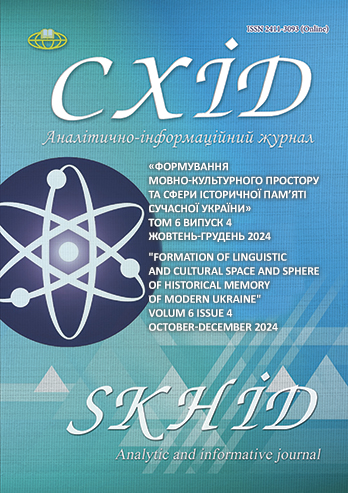Language policy of Ukraine and its representation in social doctrines of the Orthodox churches
DOI:
https://doi.org/10.21847/2411-3093.2024.643Keywords:
Church, state, social doctrine, language policy, national security, believersAbstract
The article provides a critical analysis of the leading ideas and fundamental principles of the social doctrine (teachings) of the Orthodox churches operating in Ukraine and interprets the key dominants and the specifics of their implementation of the strategic goals of the state language policy in Ukraine. The main aim is to investigate the problems of the reception of the state language strategy by Orthodox communities with different jurisdictions and to clearly clarify and justify the risks and dangers arising from the attitude to the language policy of the Ukrainian Orthodox Church, which is under the canonical subordination of the Mosokovsky Patriarchate. As a result of the study, it was proved that the role and place of Orthodox communities in the implementation of the strategic goals of language policy in Ukraine is different. Their participation in the process of implementation of the state language policy is equally ambiguous, and even openly contradictory in terms of ideological and value orientation and methods of implementation. In the case of the activity of the Ukrainian Orthodox Church of the Moscow Patriarchate, it is subversive, anti-state, harmful and poses a threat to the national security of Ukraine. The material of the article has important theoretical and practical significance in view of the integral critical justification of the state language strategy of the UOC MP and OCU as dominant vector-oriented politically oriented Orthodox jurisdictions, which is actualized in the conditions of modern challenges and leading trends and, in particular, due to the need to implement the life of legal norms, defined by the Law of Ukraine "On the protection of the constitutional system in the sphere of activities of religious organizations".
Downloads
References
For the Life of the World: Toward the Social Ethos of the Orthodox Church (2020). RISU. https://risu.ua/za-zhittya-svitu-na-shlyahu-do-socialnogo-etosu-pravoslavnoji-cerkvi_n103522
Grushetskyi, Anton (2022) Dynamics of religious self-identification of the population of Ukraine: results of a telephone survey. Press release of Kyiv International Institute of Sociology. https://www.kiis.com.ua/?lang=-ukr&cat=reports&id=1129&page=1
Social concept of the UOC (2017). Ukrainian Orthodox Church. Mukachevo diocese https://m-church.org.ua/2017/10/17/socialna-koncepciya-upc/
The Church and the World at the Beginning of the Third Millennium (2001). Declaration of the Jubilee Local Council of the Ukrainian Orthodox Church Kyiv Patriarchate (Kyiv, January 2001). https://risu.ua/cerkva-i-svit-na-pochatku-tretogo-tisyacholittya_n34612
The Russian Church at the Turn of the Century (2000). Jubilee Council of Bishops of the Moscow Patriar-chate. Journal of the Moscow Patriarchate, 9-11. https://www.pravenc.ru/text/76522.html
Verkhovna Rada of Ukraine (2003). On Ratification of the European Charter for Regional Languages or Mi-nority Languages (Law of Ukraine). Bulletin of the Verkhovna Rada of Ukraine, 30, 259.
War and Church. Church and Religious Situation in Ukraine in 2022 (Informational materials. Kyiv, 2022. https://razumkov.org.ua/images/2023/02/13/2022_Religiya_SITE.pdf
Downloads
Published
How to Cite
Issue
Section
License
Copyright (c) 2025 Микола Шкрібляк

This work is licensed under a Creative Commons Attribution-NonCommercial-NoDerivatives 4.0 International License.
1. Authors bear responsibility for the accuracy of facts, quotations, numbers and names used.
2. Manuscripts are not sent back.
3. The publisher does not always agree with the authors' opinion.
4. The authors reserve the right to authorship of the work and pass the first publication right of this work to the journal under the terms of a Creative Commons Attribution-NonCommercial-NoDerivatives 4.0 International License. This license allows others to distribute (copy) the published work for non-commercial purposes, provided there is mandatory attribution to its authors and a link to the first publication in our journal.
5. The authors have the right to conclude separate supplement agreements that relate to non-exclusive work distribution in the form in which it has been published by the journal (for example, to upload the work to the online storage of the journal or publish it as part of a monograph), provided that the reference to the first publication of the work in this journal is included.

